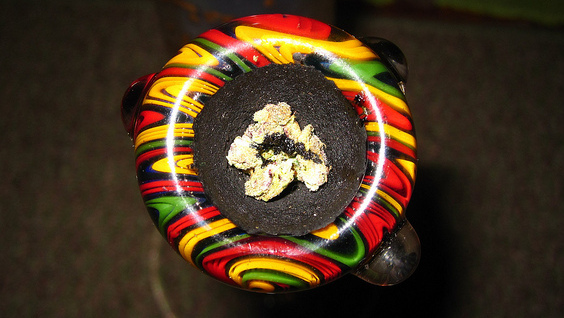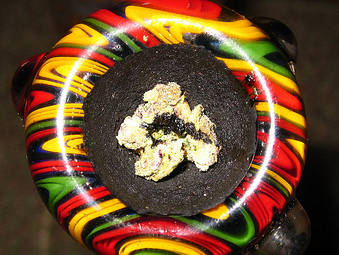
This week a Minnesota court made a historic ruling when it decided that religious use of marijuana is a valid defense for a marijuana criminal charge.
In an unpublished opinion, In the Matter of the Welfare of J.J.M.A., filed on Sept. 23, 2013, the Minnesota Court of Appeals ruled that a teenager who identifies himself as a practicing Rastafarian should not have been found guilty of possessing paraphernalia by a lower court, especially since the pipe is in no way detrimental to the public’s safety.
Originally, the lower courts found J.J.M.A., whose name has not been released presumably because he is a minor, guilty of possessing paraphernalia despite the Rastafari movement being considered a “true religion” and recognized federally by the U.S. government. Lawyers for the State of Minnesota had argued J.J.M.A “failed to satisfy his burden of showing that the Rastafari religion requires him to carry his pipe with him at all times.”
Talking to Mint Press News before the ruling was released, “Ras J.,” a relative of J.J.M.A. who asked for his identity to be protected, said that the state chose to appeal the lower court’s decision because for Rastafarians, a pipe is one of the few accoutrements in the faith and should be viewed no differently than someone carrying a rosary, wearing a cross, or drinking wine out of a sacramental chalice.
“It’s no different than a Sikh kirpan dagger,” he said. “What is more threatening, a dagger or a glass pipe? It’s silly. It’s no different than a baggie being turned into paraphernalia or a scale that isn’t full of residue. Sometimes it’s just a baggie, a scale or a pipe. This is the crap we’re dealing with.”
In an attempt to highlight the dangers of allowing a person to have paraphernalia like a pipe, lawyers for the state argued that the pipe was equally dangerous as a hand grenade. To that argument, Ras J. said one of the judges responded by saying a pipe and ammunition are not the same thing, which prompted the lawyer to compare a pipe to a decommissioned grenade. “Well that’s perfectly legal,” Ras J. said. “It’s just a chunk of metal at that point. You could give it to your 3-year-old.”
Religious symbol or paraphernalia?
According to the court documents, J.J.M.A. testified that he carries the pipe with him at all times as a reminder of his faith and so that he can “perform what needs to be performed, which is smoking.” J.J.M.A. testified that even when he is not practicing his religion, he carries the pipe to remind himself of his faith.
He said the colors on the pipe — red, yellow and green — were also of religious significance, and explained that red represents the blood of martyrs, yellow represents the sun that grows the greens, and green is for the sacred herb, “the purity of nature.”
During the court proceedings, J.J.M.A.’s testimony was affirmed by another practicing Rastafarian identified by the court documents as K.H., who reportedly has a background in religious studies. K.H. referred to the pipe as a chalice Rastafarians use to smoke herb out of during “reasoning circles,” and said that “it’s part of the actual sacramental process itself to be using a pipe [as] opposed to any other device.”
K.H. went on to say that marijuana is “something that we should use throughout our entire day. … There is a large variety of uses, but definitely the use of it in a pipe in a sacramental setting is an essential component of that usage.”
While there are no set times for reasoning circles or other Rastafari-related religious gatherings, K.H. said the “religious tradition, this chalice or this pipe is something that can be self-administered,” and that “everyone is deemed to be able to instigate a gathering.”
Based on this testimony, the Minnesota State Court of Appeals agreed to overturn the lower court’s decision citing article 1, section 16 of the Minnesota’s Constitution, which says, “The right of every man to worship God according to the dictates of his own conscience shall never be infringed . . . nor shall any control of or interference with the rights of conscience be permitted . . . ; but the liberty of conscience hereby secured shall not be so construed as to excuse acts of licentiousness or justify practices inconsistent with the peace or safety of the state.”
Both Ras J. and the unpublished opinion said that J.J.M.A. decided to cite rights granted by the Minnesota Constitution to argue his case instead of any other federal law, since the language in the state document was “distinctively stronger than the federal counterpart,” the U.S. Constitution, because the state document “precludes even an infringement on or an interference with religious freedom.”
Spiritual awakening
Records describing use of marijuana by various religious groups dates as far back as the second millennium B.C. However the Jamaican-born Rastafari movement is the most well-known modern religion to continue using the plant for spiritual purposes.
Before this case, there was another historic case in 2011, in which Jamison Arend, a licensed Rasta minister, was granted exemption from being tested for drugs while on probation, since the judge ruled testing a spiritual marijuana user for drugs was setting that person up to fail.
Many legalization advocates referred to Arend’s win as one of the first religious exemptions in the U.S., and said that there are a number of people serving prison sentences because they were unsuccessful in their claims they used the substance for religious or spiritual use.
Ras J., himself a licensed minister, said that marijuana is spiritual medicine and pointed out that even during the 1920s when alcohol was a banned substance, Christians passed out sacramental wine to people he said that “were not even necessarily sincere” in their faith.
Because marijuana’s stalk, also known as hemp, can be used to make clothing and create materials to build homes and the marijuana leaf itself can heal the sick, Spirit Leaf, a spiritual cannabis user who asked to have his identity protected, shared that the plant is seen by some faiths as having a spiritual purpose.
Referring to a verse in the scriptures, Spirit Leaf said Jahshuah (Jesus) is a healer and provider for the people who works to clothe the naked and heal the sick, which he says is the very nature of marijuana plant.
Unlike Ras J. and J.J.M.A., Spirit Leaf said he considers himself a universalist, because “everybody is my brother or sister unless you desire otherwise.”
“It might sound all flowery, but I’m very serious. You look at nature and see it is one big harmonious whole that functions and supports itself,” he continued. “Everything about it supports another part. That’s the nature of nature. Why would we fight it? We should function together that way and interact together that way. Provide for one another.”


